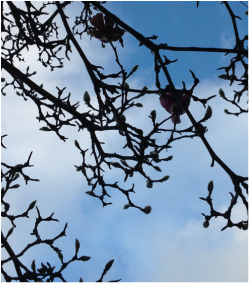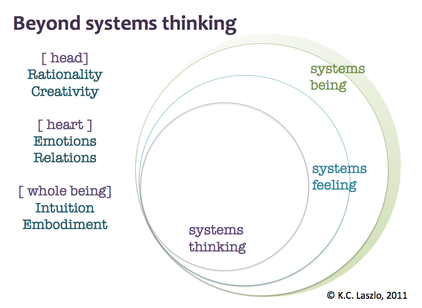 I have been teaching systems thinking as an approach to deal with complexity for many years. Complexity has become a catch word, something that is recognized as a part of modern life, something that should not be ignored or simplified. We have too many examples of reductionist approaches that tried to solve a problem through a technological (quick) fix to only find out that the solution had “side effects” that made the problem worse or created new problems. So acknowledging and even embracing complexity has been, in my opinion, a step in the right direction. However, there is still a sense of struggle… and a tendency to try to understand or at least make some sense of the complexity before we can “deal” with it. From a systems science perspective, there is a fascination with complexity models. All this is good and useful. However, I can’t but come back to my daily experience to reflect: What does “dealing with complexity” mean to me? Do I spend hours drawing complex models to understand the feedback loops of the mess in my life? Am I rigorous in the way I compare and contrast choices before making a decision? Not really. But something I do in a conscious way, is to trust my intuition. Intuition… that elusive way of knowing that is deeply embedded in our human ways, yet, systematically rejected and silenced. What if I don’t need to fully understand it all for me to move forward? What if my heart knows what’s best or what’s coming even if my brain cannot grasp it? What if my dream, the synchronistic encounter on the street, or the thought that seemed to come out of nowhere are sources of information as valuable as my overrated analytic capacities? And then, there is the emotional side of things. Yes, I’m (very) emotional. So even in my most sophisticated intellectual mode, I’m all feelings. This sensitivity has become an important compass for me. Rather than trying to keep it under control (good luck preventing my tears to come out if I feel like crying) I have decided to embrace it as the core of my way of knowing. It makes me more vulnerable, but also more authentic, or simply, more human. And this way of being more me is rooted in my being a woman. Even though I talk a lot about the importance of bringing back the feminine into our culture, what I'm really and deeply committed to do is to bring back our whole humanity. It just happens that the feminine side of things has been the one oppressed over centuries. As human beings, we are so complex: our biology, our culture, our history, our institutions, our personal experiences... there are so many entangled layers that inform who we are and why we show up (or not) in certain ways. I believe that the challenges that we face in organizations and communities cannot be fully understood by one single lens, by one simple, or worse, illusionary superior perspective. The gender lens is an important one, one that has been ignored for a long time, and therefore, one that deserves attention. But we need to work on the whole of the situation at once. And for me, the only way to do that is to focus on our humanity: What does it mean to be authentic and true to ourselves? What would it take for us to feel safe to express anything and everything that is in our hearts and minds? What would it take for us to see each other in our diversity while recognizing that we are deeply connected and that we all want to be loved and accepted? What if this radical acceptance of our uniqueness is a practice to heal ourselves and our world? I believe that only whole, healthy, fully human beings can create a good society. Complexity in nature is beautiful. We don’t need to “deal” with it. We can appreciate it, marvel at it, learn from it, work with it. It is only when we seek to control that complexity becomes a problem. And when complexity is a problem, it becomes exhausting and overwhelmingly hard work. I’m tired of that. What if complexity was welcomed with grace? Can we begin with some self-compassion and acknowledge our own complexity as people? with humility? with an understanding that we can never fully "deal" with anything but only attempt to make some meaning and take another step? I’m writing this piece as I prepare to celebrate my daughter’s 15th birthday. Becoming a mother has been the most transformative experience of my life. There is no question that having a child adds complexity to life! There is no book, no course, no advice that can prepare you for the task of caring for that new human life. But the challenge gets rightfully compensated with immense joy. My daughter has grown to become a highly reflexive teen… that’s what happens when a child gets systems thinkers as parents. She is keenly aware of the complexity of the world, or more accurately, of the mess we (adults) have created. And with youthful eyes, she questions: How did we forget that fun and laughter are really important? that we are all equal? that healthy food and clean air are more important than money? In her view, complexity is unnecessary complicatedness in human-created systems gone wacky. In my relationship with her, I’m keenly aware of how everything I do – or don’t – and everything I say – or don’t – contributes to the shaping of her consciousness as a young woman. Having grown in a traditional society with clearly delineated gender roles, I sometimes find myself in unknown territory when in my forties I begin to define who I truly am without cultural constrains. And although I consider myself a feminist and an advocate for equality, I also accept the distinct feminine essence of my being. So I’m going to try to deal with complexity with grace. I’m going to recognize that responding to my colleagues e-mails is as important as cooking a wholesome meal. I’m going to come back to gratefulness for the amazing blessings and incredible privilege that I have in my life every time I feel like it is too much. I’m going to take the time to smell the flowers, to love, and to create beauty every day. Because life is too precious and we miss its mystery when we think and worry too much. Even without understanding it all, even without feeling on top of it all, if I can feel peace and joy in my heart, then I know that I can dance gracefully with the complexity of the world.
2 Comments
 A system is a set of interconnected elements which form a whole and show properties which are properties of the whole rather than of the individual elements. This definition is valid for a cell, an organism, a society, or a galaxy. Joanna Macy says that a system is less a thing than a pattern—a pattern of organization. It consists of a dynamic flow of interactions which is non-summative, irreducible, and integrated at a new level of organization permitted by the interdependence of its parts. The word “system” derives from the Greek “synhistanai” which means “to place together.” In his seminal book Systems Thinking, Systems Practice, Peter Checkland defined systems thinking as thinking about the world through the concept of “system.” This involves thinking in terms of processes rather than structures, relationships rather than components, interconnections rather than separation. The focus of the inquiry is on the organization and the dynamics generated by the complex interaction of systems embedded in other systems and composed by other systems. From a cognitive perspective, systems thinking integrates analysis and synthesis. Natural science has been primarily reductionistic, studying the components of systems and using quantitative empirical verification. Human science, as a response to the use of positivistic methods for studying human phenomena, has embraced more holistic approaches, studying social phenomena through qualitative means to create meaning. Systems thinking bridges these two approaches by using both analysis and synthesis to create knowledge and understanding and integrating an ethical perspective. Analysis answers the ‘what’ and ‘how’ questions while synthesis answers the ‘why’ and ‘what for’ questions. By combining analysis and synthesis, systems thinking creates a rich inquiring platform for approaches such as social systems design, developed by Bela H. Banathy, and evolutionary systems design, as Alexander Laszlo and myself have developed to include a deeper understanding of a system in its larger context as well as a vision of the future for co-creating ethical innovations for sustainability. Just like the first image of Earth from outer space had a huge impact on our ability to see the unity of our planet, systems thinking is a way of seeing ourselves as part of larger interconnected systems. Most importantly, this new perception creates a new consciousness from which the possibility of a new relationship emerge: "From the moon, the Earth is so small and so fragile, and such a precious little spot in that Universe, that you can block it out with your thumb. Then you realize that on that spot, that little blue and white thing, is everything that means anything to you - all of history and music and poetry and art and death and birth and love, tears, joy, games, all of it right there on that little spot that you can cover with your thumb. And you realize from that perspective that you've changed forever, that there is something new there, that the relationship is no longer what it was." (Rusty Schweickart, Apollo 17 astronaut) Systems thinking is a gateway to seeing interconnections. Once we see a new reality, we cannot go back and ignore it. More importantly, that “seen” has an emotional connection, beautifully captured in the statement by Rusty Schweickart after his experience of seeing his home planet from space. What are the emotions evoked by perceiving for the first time the unity, interconnectedness, and relatedness of a system? What are the feelings evoked by perceiving and experiencing disconnection and isolation? Humberto Maturana says that “emotions are fundamental to what happens in all our doings” and yet, bringing up emotions in a scientific or business conversation is in many cases considered irrelevant, inappropriate or simply uncomfortable. Following Maturana’s views, I would say that the simplified answer to my two questions on the emotions evoked by unity and disconnection are love and fear, correspondingly. Love is the only emotion that expands intelligence, creativity and vision; it is the emotion that enables autonomy and responsibility. Maturana defines love as “relational behaviors through which another (a person, being, or thing) arises as a legitimate other in coexistence with oneself.” Only in a context of safety, respect and freedom to be and create (that is, a context of love) can people be relaxed and find the conditions conducive to engage in higher intelligent behaviors that uses their brain neocortex. Learning, collaboration and creativity happen when we are able to function from a consciousness capable of including a worldcentric awareness of “all of us”, as Ken Wilber puts it. On the contrary, in a situation of stress, insecurity, or any other manifestation of fear, we are conditioned to react more instinctually and to operate from our reptilian brain to fulfill more rudimentary needs linked to survival. The first image of our whole Earth from space created a sense of awe and beauty. From space, we can see (and feel) its wholeness: there are no political lines dividing our national territories, there is only one whole system. However, from our terrestrial and regionally bounded experiences, we can feel that the neighbor tribe is sufficiently different and threatening to be considered an enemy. “Before we can change the way we live, before we have saved the rainforest and the whales, we need to change ourselves. Humanity with all its different races is one. We and all other living things are nourished and sustained by the same earth” (Rema, a 14 year old girl from New Zealand). This is the leading edge of the sustainability movement: the realization that no matter how many solar panels we install, how many green products we consume, how much CO2 we remove from the atmosphere, we will not be living better lives if we do not transform ourselves, our lifestyles, choices and priorities. Sustainability is an inside job, a learning journey to live lightly, joyfully, peacefully, meaningfully. Systems being involves embodying a new consciousness, an expanded sense of self, a recognition that we cannot survive alone, that a future that works for humanity needs also to work for other species and the planet. It involves empathy and love for the greater human family and for all our relationships – plants and animals, earth and sky, ancestors and descendents, and the many peoples and beings that inhabit our Earth. This is the wisdom of many indigenous cultures around the world, this is part of the heritage that we have forgotten and we are in the process of recovering. Systems being and systems living brings it all together: linking head, heart and hands. The expression of systems being is an integration of our full human capacities. It involves rationality with reverence to the mystery of life, listening beyond words, sensing with our whole being, and expressing our authentic self in every moment of our life. The journey from systems thinking to systems being is a transformative learning process of expansion of consciousness—from awareness to embodiment. NOTE: This post is an excerpt from the plenary presentation “Beyond Systems Thinking: The role of beauty and love in the transformation of our world” by Dr. Kathia Laszlo at the 55th Meeting of the International Society for the Systems Sciences at the University of Hull, U.K., on July 21, 2011. |
AuthorKathia Castro Laszlo, Ph.D. Archives
September 2014
Categories
All
|

 RSS Feed
RSS Feed